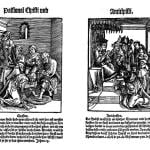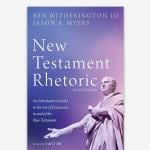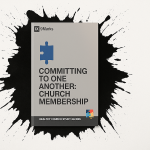I finally finished all the available Netflix episodes of The Good Place last week, months after I started them. Thought the whole thing was pretty clever and look forward to the final season. What I liked best, besides Janet, was the fairly honest attempt to follow the basic question of what happens next to its logical conclusion, albeit with a fitting amount of rollicking good humor. The trouble is, if there is a good place and a bad place (going to try not to give spoilers, but consider yourself warned), and only good people go to the good place, how, first of all, do you determine who is good and who is bad? And, second of all, what do you do about the fact that all people are basically bad? Even the best person isn’t really that good, not good enough for the good place. People need help, the viewer discovers, they need help to be good, and help to go to the good place.
Of course, the show also concludes that the whole system is rigged and that accountants keep track of all the data. They also try really hard to insist that everyone would be really very good with help, as opposed to really bad no matter what. That’s a theological proposition none of us really want to face—how bad we are and what kind of help would really be necessary to go from entrenched badness to true goodness.
The Good Place posits a system of points. Your overall score has to be really good—almost perfect—to go to the good place. Unhappily, the world is also super complicated. Every single choice you make, even if you intend for it to be an objectively good one, has rippling, and largely unseen consequences that make it impossible to do actual good, rather than just something that seems good or feels good. This is the fault of modernity, explains Michael (in the show). Five hundred years ago, people were still going to the good place, though maybe only one or two.
The scripture, of course, is much more personal about it. It isn’t a matter of algorithms, offices full of accountants, good, bad, and neutral Janets, of amassing the right number of points. When you die, you won’t arrive in some blank waiting room, anxious to have your whole life pulled up in charts and graphs, showing you how the balance tipped back and forth as you made one decision after another.
No, the whole project unfolds in a garden, a mist rolling up from the ground, so that when God planted all the trees in that good place, and then formed the man from the dust of the ground, everything was gently and perfectly watered. The first Green Movement, if you will. And there were two trees amidst all the other trees. The Tree of Life, who appears everywhere in the pages of the scripture, and the Tree of the Knowledge of Good and Evil. Rather than thousands and thousands of choices that tipped your destiny one way and then the other, there was only one choice.
Jesus takes that single choice and grapples with it in the gospel for this morning. The gentle mist that once watered the whole face of the earth is gone and the ground is hard, desolate, barren. He goes out to a place where there is nothing to eat at all, no water, no food, no froyo. He, alone, by himself, faces the terrible, singular choice that God gave Adam.
Well, he is not entirely alone. Satan, by no means a funny character, brings all the power and despair at his fingertips to influence the choice, in the hopes that Jesus will choose wrong, as Adam had done.
But Adam had been the sort of person the Good Place imagined. If all the variables were accounted for, and everything was evenly balanced, people—let’s say Adam—would do good. God, himself anticipated that objection, and provided such a place, and Adam rushed headlong to do the one thing, the one uncomplicated, though very modern thing that God told him not to do.
Jesus was not that sort of man. All the complexity in the universe—and that is really what Satan is trying to muster, in his three temptations—does not move Jesus off of his innate and true and perfect goodness. That’s the problem. It not enough to do good, you also have to be good.
The choice, then, really does matter, because it is a very personal choice, the one single decision that opens the door not only to a good place, but to goodness itself, an eternal kind of all-encompassing goodness that can never be argued away, or destroyed, or confused, or tampered with. The choice was offered to Adam, and mercifully, because of Jesus, it is again offered to you, and to me. It is the Tree of Life, Jesus himself.
I mean, given the chance to imagine a good place, most of us would construct some kind of comfortable neighborhood in which we recognized goodness—clean restaurants, a complete absence of illness, McMansion like houses full of Ikea furniture and Pier One sconces. The main that is that we ourselves, each of us individually, of course, would be completely relaxed and happy. All the trouble comes in when “we” have to try to get on with each other. If the choice is for myself, surely that must be a good choice?
Adam thought he was making the good choice—for himself—but it was the wrong one. The good place is the one place where you lose yourself in a vast and perfect communion with your maker, your God, the one who loves you. Do you want me, said God to Adam, or do you want yourself? And Adam said that he wanted himself. As I said, it’s a touch too personal.
Another way to say it is, Trust. The only way into the good place is to trust in Jesus, to put yourself into the hands of the one who made everything and agree that He is good, and you are not. He is so good that he actually took all the consequences of all the wretched and wrong decisions, every single unseen and hidden ramification of your badness, and went with it all the way into the bad place and got rid of them forever.
You can go to the good place. Of course. But not because you are good, only because Jesus is good, and by wrestling with and defeating Satan, he opens the door to his own perfect goodness. You only have to trust him.
















